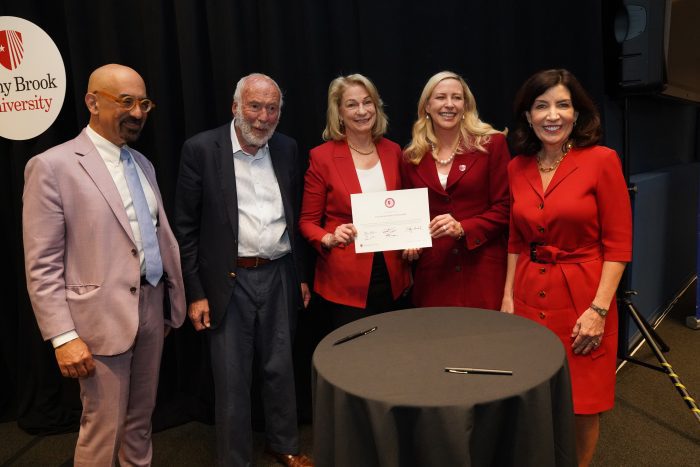Note to our readers
Next week will be the last issue we run letters of endorsement for village candidates. Deadline for submission: Tuesday, June 6, at noon.
Seeking asylum: legal then, legal now
In 1954, President Dwight Eisenhower [R] pushed immigration law in a radical new direction. Instead of housing people in immigrant detention facilities like Ellis Island, such facilities were closed. While immigrants were being processed by the authorities, they would let people live wherever they wanted, blending into communities.
If a Republican president in the 1950s could take such a radical step toward humane immigration, I ask what are the Republican legislators of Suffolk County doing in 2023? Clearly acting inhumanely by drumming up fear. Fear of “those other people.” Stoking that fear as a cheap parlor trick to motivate their base while endangering the lives of countless people regardless of their nation of birth or their documentation.
Most of us have relatives who came to America looking to escape persecution, not of something they did but because of who they are. This is the same for many of today’s immigrants. The story is the same, it’s simply the country of origin that varies. These immigrants deserve a chance to live just as our relatives did.
Some 150 years ago there was a Latvian-Jewish immigrant working as a tailor in Reno, Nevada, named Jacob Davis. Jacob had customers whose work pants kept tearing. To solve the problem, he added metal rivets at the stress points of the pants, making them stronger. When he realized he had a product worth mass producing he teamed up with a merchant in San Francisco, Levi Strauss, another immigrant. On May 20, 1873, they obtained a U.S. patent on a style of jeans still worn today.
We can only speculate the challenges of the next 150 years, but I’ll tell you this. It’s going to require the creativity of as many people from as many diverse backgrounds as possible to solve. When some members of the Suffolk County Legislature decided to respond to the current migration situation with “not our problem,” they gave the incorrect response, for it does not set us up for success on the world stage of tomorrow.
Ian Farber
East Setauket
LaLota’s disturbing immigration posture
I found your story of Suffolk County Republicans including my Congressman Nick LaLota’s [R-NY1] attempt to keep immigrants seeking asylum from coming to Suffolk County very disturbing. [“Republican lawmakers, immigration advocates clash over asylum seekers,” TBR News Media, May 25.]
We are better than that. Seeking asylum is both legal and an important principle. Jews, Irish, Italians, Chinese and others came here effectively seeking asylum because of the many dangers in their home countries. Those groups and others were vilified at first but have made important contributions to our country.
We, as a nation, depend on immigrants for our enormous innovation, progress and energy. All American communities must do our part to welcome these people and help them get a good start here. This is not only the right thing to do, it is very much in our country’s interest.
The problem at the southern border was not caused by President Joe Biden [D] but by a Congress that has failed to pass a safe and humane immigration policy. Pandering to our worst instincts, rather than leading and making good proposals to solve the problem, do more harm than good.
Adam D. Fisher
Port Jefferson Station
An open letter on striped bass fishing
To DEC Commissioner Basil Seggos:
Our offices have been contacted by concerned fishermen and boat captains regarding the Atlantic States Marine Fisheries Commission’s emergency measures to further reduce the size of striped bass for the East Coast Fishery.
It is our understanding that these emergency measures, changing the limit on keeper fish from one fish a day from 28 inches to 35 inches to one fish a day from 28 inches to 31 inches, are currently being reviewed by the Department of Environmental Conservation with the federal requirement to implement them by July 2.
We are being told by our recreational fishermen and boat captains that this rule change will greatly raise the mortality rate of striped bass causing an increase in catch-and-release deaths. This will obviously have the reverse effect on efforts to increase the stock.
Additionally, we have been informed that the for-hire industry utilizes less than 5% of the striped bass stock. The economy of our region is driven by the agricultural and fishing industries. The rich history of our fishermen is a legacy that attracts many tourists and enthusiasts to our area. It will become extremely difficult to encourage would-be customers to use charter and party boats with such a narrow window of striped bass possession.
We are asking that before any emergency measures are adopted by the DEC, a careful review is done based on input from our local fishermen and captains. As you are well aware, our fishing industry is already struggling with difficult quotas, the high cost of fuel, the high property and docking costs in our area, among other challenges. We are hopeful that you will put any plans on hold until all stakeholders are brought to the table and have the opportunity to share their input and concerns.
Please contact our offices if you have any questions or need additional information. We look forward to your expeditious response.
NYS Sen. Anthony Palumbo (R-New Suffolk)
NYS Assemblyman Fred Thiele (D-Sag Harbor)
A challenging race
When I ran for trustee for the Village of Port Jefferson last year, I had the full faith and support of Port Jefferson’s mayor, deputy mayor and the clerk’s office. I was guided through the petition submission process and the mayor even numbered my petition sheets.
In the eight months following the 2022 elections, I went from being an establishment candidate to the opposition. I asked questions and challenged decisions that I found questionable and at times, autocratic. That is why I decided to run for mayor.
Now, my opponent’s campaign and its lawyers challenged my petitions and due to an issue with the cover sheet, the Suffolk County Board of Elections on May 30 determined that my name cannot be placed on the ballot.
I am committed to continuing my campaign for mayor even if it means I’ll be a “write-in” candidate. It may be an uphill battle, but I will not quit the people of Port Jefferson.
If you believe that we need a fresh start in Port Jeff, and that you should have a choice for mayor, then write in “Lauren Sheprow” under the column for mayor on June 20. This is your village and your vote should count.
Lauren Sheprow
Mayoral candidate and trustee
Village of Port Jefferson
No political campaigning on sacred days
First, let me say that Memorial Day is a day of sacred observance where we honor those who have given the full measure of commitment to America — their lives. We celebrate the freedom their commitment and those of their more fortunate brothers and sisters have maintained for us.
Memorial Day is a celebration of freedom and we celebrate it together in the spirit of unity. This is not a day for political campaigning. We like to hear what our elected leaders have to say about unity, America and freedom. We do not appreciate their campaign slogans, campaign attire and campaign leafleting of a parade that is a unifying event.
Please encourage those who engaged in these activities at the Setauket Memorial Day Parade and honorary activities mind their manners and respect those who have served and sacrificed. Ask them to do better on July 4, 9/11 and Veterans Day/Armistice Day.
We need to find some common ground if we are to continue to be a democracy. Bad political manners need to be called out.
Bruce Miller
Sgt. E-5, U.S. Army Armor (former)
2nd Vice Cmdr., American Legion Post 432
Port Jefferson Station
Juliano, the integrity candidate
Just wanted to take the opportunity to tell you a little about my husband, Bob Juliano, who is running for trustee in the Village of Port Jefferson.
Bob has spent 30 years in public service. The first eight years were spent as treasurer in the Village of Lindenhurst, then 18 years as administrator/clerk for the Village of Port Jefferson, followed by the Village of Westbury as clerk/treasurer until his retirement last year.
For those who know Bob, you know that this man is hardworking, he is smart, honest and reliable. Although this sounds like a Labrador Retriever, it is the man I have been married to for almost 38 years and I believe it is what we need in the Village of Port Jefferson.
He worked tirelessly in his time with the village. I was with him when he would receive calls on the weekends and respond by doing a well visit, or checking someone’s property for them. During Hurricane Sandy, he was at the “bunker” taking care of the village, not home with his family. He was doing his job.
I feel it is time we give Bob a chance to have a voice in the village where he had his hands in everything that went on. Talk about experience, no one can top his. He knows this village, how it runs and how it should run. I hope you will vote for Bob on June 20 at the Village Center. Integrity matters.
Kelly Juliano
Port Jefferson
Snaden would have no learning curve
With the mayoral election less than 30 days away, we need to give careful thought as to who is best qualified and capable of leading the village for the next two years. The dangers of an inexperienced mayor cannot be overstated.
Deputy Mayor Kathianne Snaden has many years of experience and would have no learning curve when she assumes office.
Institutional knowledge saves the taxpayers money, and Kathianne has amassed a tremendous amount of knowledge and hands-on understanding of what is necessary to move the village forward in the coming years.
Her resume is extensive: She is the Village of Port Jefferson commissioner of Public Safety, also Planning and Building; she is trustee liaison to code, courts, parking and mobility, Business Improvement District, Zoning Board of Appeals, Architectural Review Committee and the employees union. Most importantly, if Kathianne loses, we not only lose a committed public servant but a strong liaison to our schools.
Losing Kathianne would be a significant blow to our community. If she is not elected, a trustee would be elected without any input from voters, adding yet another inexperienced member to the board.
We cannot afford to take risks with our village’s future. We must elect an experienced, seasoned leader who can hit the ground running. That leader is Kathianne Snaden. Please vote for her on June 20 from 6 a.m. to 9 p.m. at the Village Center.
Jennifer Testa
Port Jefferson
Review candidates’ history
In reference to our up-and-coming Port Jefferson mayoral election on June 20, I would recommend the village residents to google our candidates’ past employment and endeavors, as you would do if you were hiring a new employee for any political or nonpolitical position. By googling one’s past employment and endeavors, it will give you the insight to see how they will acclimate to their new positions.
This being said, I would recommend that you google candidates Kathianne Snaden and Lauren Sheprow, who was the previous head of media relations at Stony Brook University.
I believe the best choice for the future of Port Jefferson village is to elect Kathianne Snaden for mayor. I base this opinion on her experience, integrity, character, honesty and transparency.
Joey Zangrillo
Port Jefferson
WRITE TO US … AND KEEP IT LOCAL
We welcome your letters, especially those responding to our local coverage, replying to other letter writers’ comments and speaking mainly to local themes. Letters should be no longer than 400 words and may be edited for length, libel, style, good taste and uncivil language. They will also be published on our website. We do not publish anonymous letters. Please include an address and phone number for confirmation.
Email letters to: [email protected] or mail them to TBR News Media, P.O. Box 707, Setauket, NY 11733

















